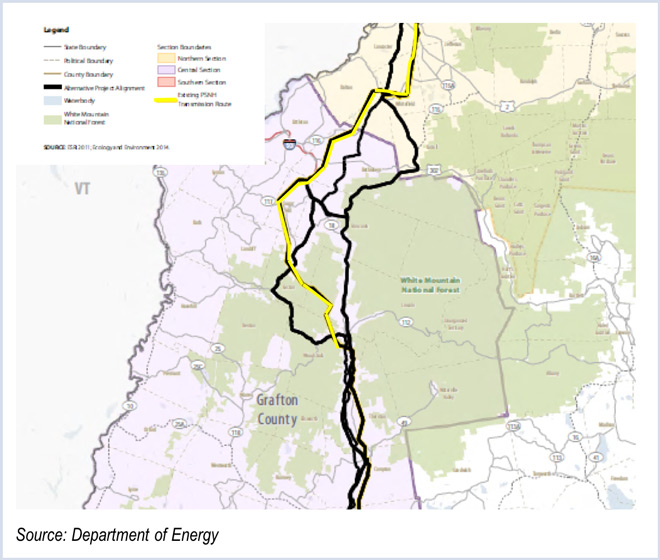By William Opalka
The price tag on the proposed Northern Pass transmission line in New Hampshire appears likely to rise after a draft environmental impact statement released last week showed the cheapest route would also have the greatest environmental impact.
The draft EIS by the U.S. Department of Energy evaluates various alternatives for the 187-mile route that would connect Canadian hydropower with the wholesale energy markets in New England.
The developers’ preferred route would require the creation of a new, 40-mile right of way measuring 150 feet wide. Identified as Alternative 2, the route “would impose the greatest environmental impacts as compared to the other action alternatives primarily because of visual impacts, vegetation removal and ground disturbance required,” according to the department.
It “would also have the least cost of construction (approximately $1.06 billion).” The department also said it would cost an additional $564.1 million in “economic impacts from construction.”
Only 8 miles of the northernmost section would be buried under the cheapest scenario, but the developer appeared to leave open the possibility that more of the route could be laid underground, saying it is reviewing the reaction to the document and giving “further consideration” of the “potential view impacts related to overhead lines.”
“These and other conclusions in the DEIS will help inform our forthcoming proposal to the state of New Hampshire’s Site Evaluation Committee,” Northern Pass Transmission, an Eversource Energy subsidiary, said in a statement. “As we’ve stated, we plan to propose a new, balanced plan in the near future that incorporates the feedback we’ve heard in discussions across the state and will address those concerns while providing substantial economic benefits to New Hampshire.”

“She will continue to encourage the company to listen to the concerns of Granite Staters, and if it is going to move forward, propose something that ensures lower costs for New Hampshire ratepayers and that protects our scenic views and beautiful natural resources, which are critical to our economy,” Hinkle said.
Environmental advocates, outdoorsmen and elements of the tourism industry have lobbied for burial of the entire route — the most expensive alternative.
“The Department of Energy’s alternatives analysis provides strong evidence that the overhead transmission line proposed by Northern Pass or just partial burial in the vicinity of the White Mountain National Forest would cause considerable environmental and scenic damage compared to total burial of the project,” Kenneth Kimball, director of research for the Appalachian Mountain Club, said in a statement.
The department said its draft EIS concluded that “the alternatives that would be constructed underground along existing roadways … would impose the fewest environmental impacts due to the lack of visual impacts and use of already disturbed roadway corridors. However, all of the underground alternatives … would have the highest construction costs (between approximately $1.83 billion and approximately $2.11 billion).”
The 1,200-MW project is a joint venture of Eversource Energy and Hydro Quebec. It was proposed in 2010 and, if the current schedule holds, would be completed in 2019. (See Eversource: Northern Pass Delayed Until ’19; Earnings Up.)
According to the report, the company’s preferred route, and a similar 1,200-MW alternative, would provide the greatest benefit for the wholesale energy markets. It would decrease wholesale electricity costs by $22 million in New Hampshire and by $149 million across ISO-NE. Other alternatives with a 1,000-MW capacity would only save $18 million and $134 million, respectively.
The department also said that the preferred route is the only alternative inconsistent with the existing White Mountain National Forest Plan. Overhead transmission would be seen from “historic architectural resources and thus could adversely affect the historic context of these sites more than the underground alternatives.”
A 90-day comment period will begin once the study is published in the Federal Register.


